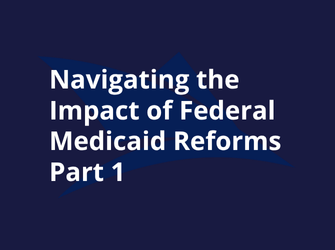As Medicaid continues to play a vital role in providing care to vulnerable populations across the United States, the program is facing intense scrutiny and potential overhaul. The upcoming fiscal year 2025 budget decisions, along with proposed restructuring efforts in Congress, highlight the increasing challenges and pressures on Medicaid and the organizations that rely on it. For Medicaid MCOs, understanding these changes and preparing for possible disruptions will be crucial in navigating the future landscape.
Proposed Medicaid Budget Cuts: The Key Concerns for MCOs
In early February 2025, as Congress began to deliberate on the fiscal year 2025 budget resolutions, a significant concern emerged—Medicaid may face substantial funding cuts. The House Republicans’ proposed budget calls for a $1.5 trillion reduction in mandatory spending over the next ten years, with Medicaid bearing a considerable portion of these cuts. The Energy and Commerce Committee, which oversees Medicaid, has been instructed to find at least $880 billion in reductions to health care programs, including Medicaid.
This development has sparked widespread concern, with organizations like the American Hospital Association (AHA) urging Congress to reconsider drastic cuts to Medicaid. Rick Pollack, AHA’s President and CEO, emphasized that Medicaid serves some of the most vulnerable populations in the country—pregnant women, children, the elderly, people with disabilities, and low-income working families. Reductions to this program would not only disrupt the delivery of care but also place significant pressure on Medicaid MCOs that are responsible for managing services for these groups.
For Medicaid MCOs, these proposed cuts represent a major operational challenge. With reimbursement rates potentially shrinking and eligibility criteria shifting, MCOs may face increased financial strain. Furthermore, a reduced budget could force MCOs to rethink their care management strategies, potentially impacting the quality and accessibility of services.
Budget Reconciliation and Medicaid’s Future
As the debate over the 2025 budget heats up, one of the key vehicles for implementing these changes is the budget reconciliation process. The reconciliation process is a powerful legislative tool that allows for changes to mandatory spending programs like Medicaid. As the House and Senate mark up their respective budget resolutions, the potential for Medicaid to be targeted for cuts remains high.
The Senate’s approach to the budget resolution includes a focus on defense, border security, and tax reform, but the implications for Medicaid are equally important. While the Senate budget resolution has yet to be finalized, it is expected to set the stage for further discussions about reducing spending on health care programs. Given the historical role of Medicaid in the reconciliation process, Medicaid MCOs must closely monitor these developments and assess their impact on future program funding and service delivery.
Industry Pushback: Protecting Medicaid’s Vital Role
As the reconciliation process moves forward, various stakeholders, including the AHA, are actively pushing back against proposals that would harm Medicaid. Medicaid MCOs should be aligned with these efforts to ensure that the voices of those who rely on Medicaid are heard. The AHA has made it clear that Medicaid is a lifeline for millions of Americans, and any efforts to cut funding would not only hurt the most vulnerable populations but also threaten the stability of the entire health care system.
In addition to these political advocacy efforts, Medicaid MCOs should start preparing for a range of possible outcomes. Whether it's adjusting to lower funding levels or navigating changes in service delivery models, proactive planning will help ensure that MCOs can continue to meet the needs of their members regardless of the budgetary challenges ahead.
Agilian 2025 Medicaid Playbook: Preparing for Change
The future of Medicaid is uncertain, with proposed budget cuts and restructuring efforts on the horizon. However, Medicaid MCOs can take proactive steps to mitigate the risks associated with these changes. One key way to prepare is by leveraging resources like the Agilian 2025 Medicaid Playbook.
This playbook addresses the anticipated elimination of federal match funding for Medicaid, which presents an urgent financial challenge for beneficiaries, payers, and providers. Experts expect 2025 will be the first time in history that federal overall Medicaid spending declines. The playbook offers a clear roadmap for Medicaid enterprises, including MCOs, on how to prepare for the impending reductions. It outlines key actions to protect beneficiaries and ensure continued access to care as funding shifts.
For Medicaid MCOs, staying informed, advocating for the program’s protection, and preparing for potential shifts in funding and policy will be crucial to continue providing critical services to the populations who need them most.
Want access to the playbook? Download it now: FMAP Cuts Edition- Agilian 2025 Medicaid Playbook
Sources:
-
The Hill. "Republicans Put Healthcare Cuts Front and Center to Advance Agenda." The Hill, February 13, 2025.
-
Health Affairs. "What Lies Ahead For Medicaid In Budget Reconciliation?" Health Affairs, February 11, 2025.
-
American Hospital Association. "House and Senate Consider Separate Budget Resolutions; AHA Urges Congress to Take Seriously Impact." AHA News, February 12, 2025.
-
Medicare Rights Center. "New Congressional Attempt to Cut Medicaid Through Budget Reconciliation." Medicare Watch, February 13, 2025.
.png?width=352&name=2025.10.7%20Medicaid%20Eco%20Under%20Trummp%20blog%20(2).png)


